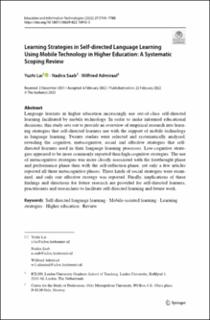Learning Strategies in Self-directed Language Learning Using Mobile Technology in Higher Education: A Systematic Scoping Review
Peer reviewed, Journal article
Published version
Permanent lenke
https://hdl.handle.net/11250/3050447Utgivelsesdato
2022-02-22Metadata
Vis full innførselSamlinger
- Publikasjoner fra Cristin [3269]
- SPS - Documents [424]
Originalversjon
Education and Information Technologies : Official Journal of the IFIP technical committee on Education. 2022, 27 (6), 7749-7780. https://doi.org/10.1007/s10639-022-10945-5Sammendrag
Language learners in higher education increasingly use out-of-class self-directed learning facilitated by mobile technology. In order to make informed educational decisions, this study sets out to provide an overview of empirical research into learning strategies that self-directed learners use with the support of mobile technology in language learning. Twenty studies were selected and systematically analysed, revealing the cognitive, metacognitive, social and affective strategies that self-directed learners used in their language learning processes. Low-cognitive strategies appeared to be more commonly reported than high-cognitive strategies. The use of metacognitive strategies was more closely associated with the forethought phase and performance phase than with the self-reflection phase, yet only a few articles reported all three metacognitive phases. Three kinds of social strategies were examined, and only one affective strategy was reported. Finally, implications of these findings and directions for future research are provided for self-directed learners, practitioners and researchers to facilitate self-directed learning and future work.
Utgiver
SpringerSerie
Education and Information Technologies : Official Journal of the IFIP technical committee on Education;Volume 27, issue 6Tidsskrift
Education and Information Technologies : Official Journal of the IFIP technical committee on EducationOpphavsrett
© The Author(s) 2022Beslektede innførsler
Viser innførsler beslektet ved tittel, forfatter og emneord.
-
The Hierarchical Continuous Pursuit Learning Automation: A Novel Scheme for Environments With Large Numbers of Actions
Yazidi, Anis; Zhang, Xuan; Lei, Jiao; Oommen, John (IEEE Transactions on Neural Networks and Learning Systems;Volume: 31, Issue: 2, Journal article; Peer reviewed, 2019)Although the field of learning automata (LA) has made significant progress in the past four decades, the LA-based methods to tackle problems involving environments with a large number of actions is, in reality, relatively ... -
The Hierarchical Continuous Pursuit Learning Automation for Large Numbers of Actions
Yazidi, Anis; Zhang, Xuan; Lei, Jiao; Oommen, John (Chapter; Peer reviewed, 2018-05-22)Although the field of Learning Automata (LA) has made significant progress in the last four decades, the LA-based methods to tackle problems involving environments with a large number of actions are, in reality, relatively ... -
Arts-based learning in vocational education: Using arts-based approaches to enrich vocational pedagogy and didactics and to enhance professional competence and identity
Meltzer, Cecilie; Schwencke, Eva (Journal of Adult and Continuing Education;2019, Journal article; Peer reviewed, 2019)This article discusses in what way arts-based learning can complement and enrich vocational pedagogy and didactics. It examines how artwork and artistic, educational practices can enhance professional and vocational skills, ...

